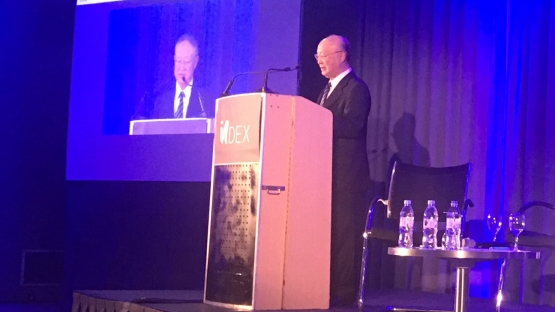(As prepared for delivery)
Good afternoon, Ladies and Gentlemen.
I am very pleased to speak at this 2018 Conference on International Nuclear Digital Experience.
Let me start by stating my belief that nuclear science and technology have a great deal to offer in helping to solve some of the key problems facing the world in the 21st century.
I believe that nuclear power will make a significant and growing contribution to sustainable development in the coming decades.
As this audience knows very well, nuclear power is one of the lowest-carbon technologies for generating electricity. Nuclear power plants produce virtually no greenhouse gas emissions or air pollutants during their operation. Emissions over their entire life cycle are very low.
Today, nuclear power produces 11 percent of the world’s electricity. But when it comes to low-carbon electricity, nuclear generates almost one third of the global total.
In my opinion, it will be difficult for the world to meet the twin challenges of securing sufficient energy, and of limiting the average global temperature increase to 2 degrees centigrade, without making more use of nuclear power.
Technological innovation in the nuclear field will be very important. That includes making the most effective use of information technology, which was the subject of your conference. I will say more about the role of the IAEA in this field in a moment.
Ladies and Gentlemen,
Some 70% of the world’s electricity comes from burning fossil fuels, according to the International Energy Agency. By 2050, if climate change goals are to be met, around 80% of electricity will need to be low-carbon.
It is clear that renewables such as wind and solar power will play an increasingly important role in the future. However, these are intermittent energy sources which cannot meet countries’ needs on their own. That means more use of nuclear power will be needed.
There are now 451 nuclear power reactors in operation in 30 countries. Another 58 reactors are under construction, mostly in Asia.
Global installed nuclear capacity is now the highest that it has ever been at 394 gigawatts electrical. Twenty-six new reactors have been connected to the grid since 2015.
However, 14 power reactors have been shut down in the last three years and some countries have decided to phase out nuclear power completely. Global nuclear electricity production remains below 2010 levels.
Clearly, the pace of construction of new nuclear power plants will need to be stepped up if the world’s future energy needs, as well as climate change goals, are to be met.
Ladies and Gentlemen,
In my visits to nuclear power plants throughout the world, I have seen a steady increase in the use of digital systems.
As you have been hearing at this conference, digital systems promise higher reliability, more functionality, better plant performance, additional diagnostic capabilities and many other advantages.
But, of course, new digital systems also bring new challenges, including those related to nuclear safety and security. The nuclear industry and national regulators need to build up the methods, data and experience to ensure that new systems meet all reliability and performance requirements.
The IAEA helps Member States to share information, experience and recommendations with each other, including in the digitisation of instrumentation and control systems. Our Technical Working Group on Nuclear Power Plant Instrumentation and Control helps us to identify key areas of common interest in this field.
Numerous IAEA publications have focussed on these issues. For example, an Agency report in 2015 identified 17 critical technical challenges in the application and licensing of digital instrumentation and control systems in nuclear power plants.
Increasing use of digital technology leads to a greater risk that instrumentation and control systems in nuclear power plants could be subject to cyber-attacks, with potentially serious consequences.
Nuclear security, like safety, is a national responsibility. But the IAEA serves as the global platform for strengthening nuclear security, helping countries to prevent, detect and respond to malicious acts involving nuclear material or radioactive substances.
We recently published a technical guidance report entitled Computer Security of Instrumentation and Control Systems at Nuclear Facilities to help address this important issue.
Ladies and Gentlemen,
Let me conclude by assuring you that the IAEA remains committed to working with our 170 Member States, and with the nuclear industry, to help ensure the optimal use of modern digital technology in the nuclear field.
Thank you.


